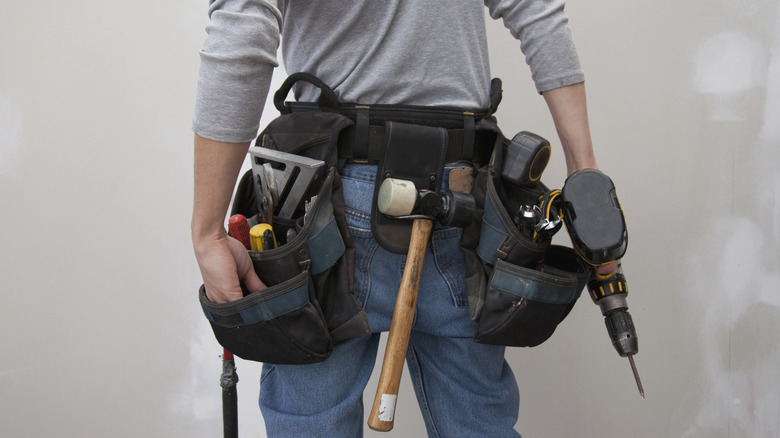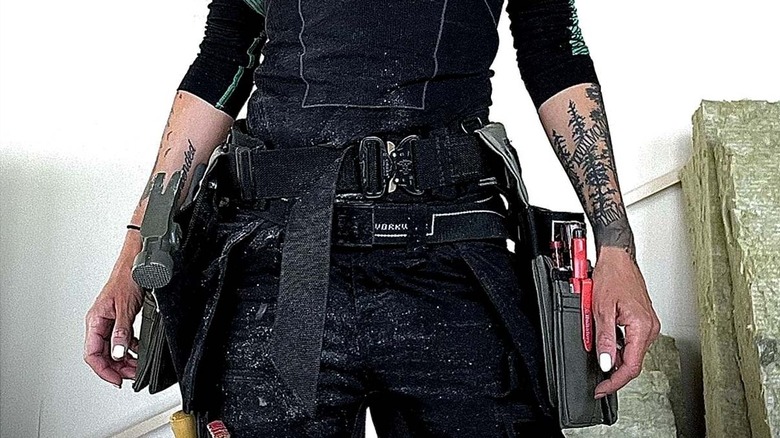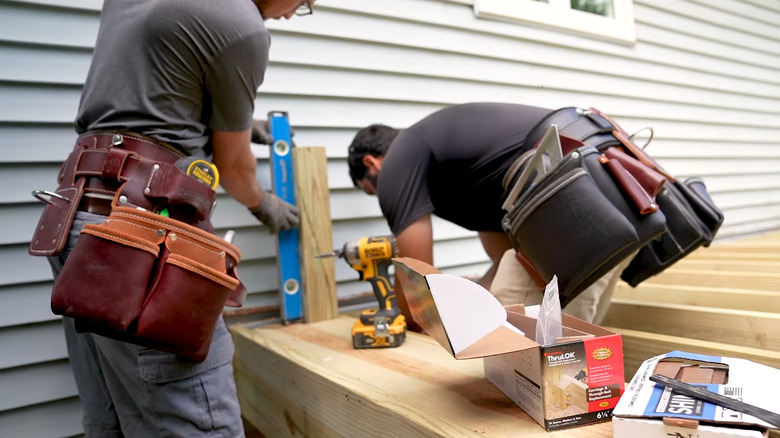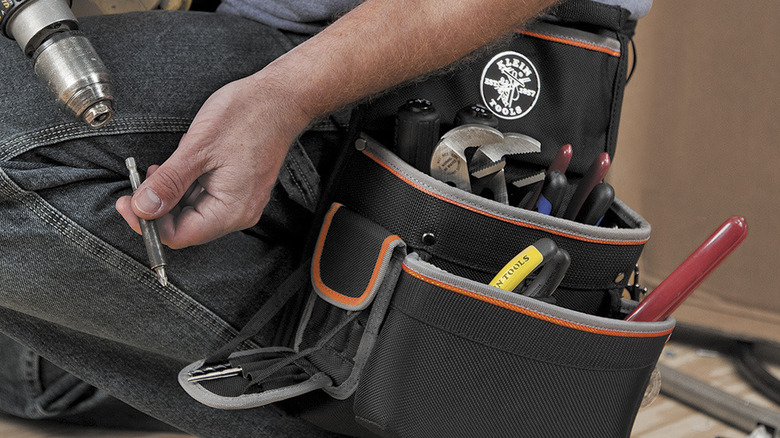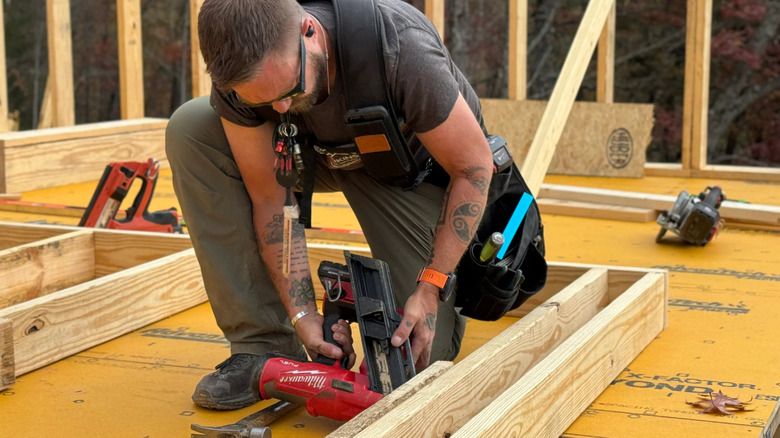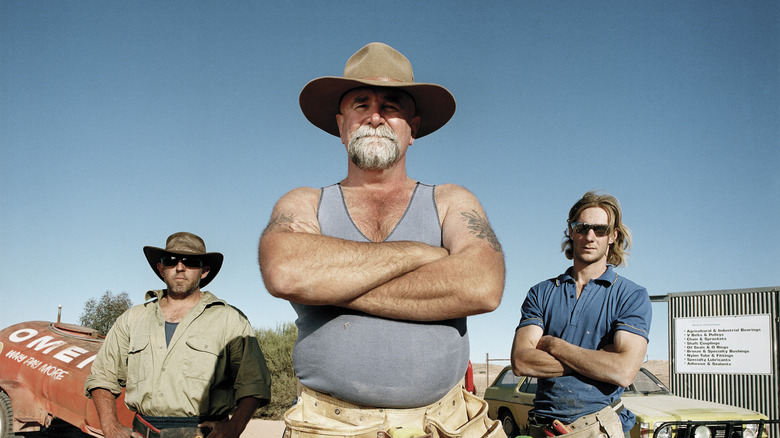Tool Belt Brands That Are Worth The Investment And Which You Should Avoid
We may receive a commission on purchases made from links.
Tool belts are, unsurprisingly, like tools. This bit of profundity might be underwhelming, but consider: You don't always choose the best tools because sometimes they're not necessary and can be prohibitively expensive. Rather, you'd choose a model based on what it has to offer and what, specifically, you anticipate needing. Because needs and prices are relative, we picked nine tool belt brands at a wide range of prices, from Diamondback and Occidental Leather to Carhartt and Jackson Palmer.
A lot goes into choosing the right tool belt. For a professional, quality (in terms of durability and fit and finish) might be the key factor, but it's more likely to be the belt configuration, customizability, and suitability for a particular trade or use. These are also the key factors for hobbyists and DIYers, along with price and value for money. And price is no small thing. Depending on where you shop, the average cost of best-selling tool belts can be as high as $280 or as low as $50, a difference that usually reflects the amount of time a user will spend wearing it.
You'll also have to make a decision about which tool belt style suits you best: suspender tool belts, waist/hip tool belts, or apron-style tool belts. For some generalists and when working with specific trades, it often makes sense to mix and match belts and pouches from various makers that fit the owner's needs. So, if you're looking for a holiday gift for the handyman in your life, a tool belt is a great choice, but you might end up doing some guesswork. Luckily, we've compiled all the necessary info and reviewer sentiment to help you make the best choice.
Diamondback and Badger: Exceptional nylon tool belts
Brands like Diamondback and Occidental Leather's Badger bring top-quality, innovation, materials, and craftsmanship to their nylon tool belts, aprons, and vest systems. Both are heavily focused on supplying tool belts to professionals, and they often have price tags that will take the breath away from DIY weekend warriors. Diamondback's belts feature 1000-denier military-grade nylon pouches, which the company says is comparable to or better than leather when it comes to durability. Their products support specific trades and various sets of capacity, mobility, and modularity options. Diamondback tool belts are a TikTok favorite for home projects and can cost as much as $486.
Badger also specializes in nylon belts (and tool bags) made from 1000-denier Cordura nylon, often reinforced with military-grade tactical webbing. Padding and wide belt panels ensure comfort. Badger also claims to use military hardware and military thread, and while it's not clear exactly what those terms mean, the products certainly are loved by workers in the market for a lightweight but durable tool belt.
Reviews for Diamondback and Badger belts are very similar. The nylon starts out stiff and breaks in fast. They're lightweight and durable, with no meaningful wear and no loose stitching even after a year or so of use. Fit, pouch placement, and configuration seem to be driven by personal preference, but overall, reviewers appreciate most of those aspects from both brands.
Occidental Leather and Custom Leathercraft: Ultimate durability
Pros who use their tool belts day in and day out are quick to tell you that fabrics like Cordura are great if you're okay with replacing your model once or twice a year. But to some extent, that's an old-school way of thinking. This is evident in Occidental Leather adding cotton duck aprons and industrial nylon tool belts to its vaunted line of graded leather belts, bags, and vests.
Occidental Leather talks about their customers buying into a community, and these people sometimes seem to appreciate the exclusivity of the products nearly as much as their near-perfect quality and design. The brand's belts and pouches are specifically designed in left- and right-hand versions and are hand-made in the United States. Reviewers rave about Occidental belts and say the nylon belts fare as well as the all-leather models. Most reviews seem to be oriented along the lines of "it's worth the price," though a few comments say the frequently changing lineup of components and materials makes ordering a little unpredictable.
Custom Leathercraft and its Canadian brand, Kuny's Leather, are among the most respected tool belt brand's available, in spite of offering some components at a much lower price point than other premium brands. (Their complete tool belt systems continue to be pretty pricey.) Both brands have also expanded their offerings to include durable nylon cloth options. In 1990, Custom Leathercraft rebranded itself as CLC (possibly in an effort to signal broader offerings, a la KFC) and offers a much broader line of products than most high-end tool belt companies.
Gatorback, DeWalt, Klein Tools, and AWP: Reasonably priced innovation and focus
The middle of the pack is often the place to be for serious DIYers who want a quality product at a reasonable price. Some of the companies in this space, like Gatorback and AWP, are dedicated to tool belts and similar products, while others are big-name tool companies. All of them are innovative, quality-focused manufacturers, and they often excel at niche belts for specific trades.
AWP's recent claim to innovation fame is its TrapJaw system. The spring-loaded mechanisms allow you to snap your pouches and bags open and closed for easy access while not losing items during transport and storage. Meanwhile, Gatorback is laser-focused on producing the best mid-priced tool belts and accessories for electricians, carpenters, and foundation layers (they make the only belt we've seen made specifically for foundation pros).
It's not uncommon for companies like Gatorback to make belts and pouches specifically for electricians, but any electrician is going to have a long look at a belt from Klein Tools. The brand makes some of the most highly regarded electricians' tools in the industry, and that includes belts. Klein's offerings are suitable for purposes beyond electrical work, especially when a larger number of smaller tools are involved. DeWalt is another common tool brand you might see getting some love in the tool belt space. In fact, the brand might be the second most commonly lauded tool belt manufacturer after Occidental Leather. Part of that is the value DeWalt offers — they offer prices that are comparatively low for the quality they offer.
Perkins Brothers, Carhartt, and Jackson Palmer: Great values
We've relegated Perkins Brothers tool belts to the grouping with less expensive and slightly less-regarded brands, but only because their offerings are relatively new and slightly unorthodox in their use of 1200-denier Oxford cloth. It's a well-thought-out design that, when purchased as a full system, is not overpriced at $199.99. In some ways, Carhartt has a different approach from Perkins Brothers. As with their quasi-fashionable clothes for tradespeople and mall-goers alike, Carhartt straddles the intersection of cost, durability, and function (though perhaps a little awkwardly at times). The company excels at lightweight and fairly well-appointed canvas aprons and tool belts — like its polyester canvas Legacy Tool Belt — and even makes a few nods toward modularity and improved durability. You could do worse for a general-purpose tool belt.
Jackson Palmer tool belts are a third way of approaching the market, and maybe the most relevant for home DIYers. The company makes two belt styles and a hybrid belt/apron that appear to be targeted to DIYers and professionals without the motivation or resources to spend $600. It's hard to find fault with their features, and their pro tool belts are reasonably durable, owing to reinforced stress and wear points. They're also known for being extremely comfortable. Maybe not as durable as an Occidental Leather belt, but you're not going to do much better than Jackson Palmer for $18 to $47.
Using multiple brands, and avoiding some brands altogether
These are all great brands. All of them do some things really well, and none of them do everything perfectly. The logical approach to buying all but the most specialized of tool belts might be to combine belts and pouches from different makers based on your particular needs. Fortunately, many belt components are interchangeable by virtue of their connection systems... 2-3-inch clips or slots and loops. Some companies have hook-and-loop fasteners and proprietary connectors that might or might not be compatible with other brands. But the idea is that you can take advantage of the astonishing variety of pouches and tool holders available to craft a solution just for you. There's another possibility as well: Maybe you don't need a toolbelt at all, but an apron or pants, a vest or a bag, or even an apron made from an old pair of jeans. But in all likelihood, the solution for the average gearhead will be to own at least one of each.
The other benefit of interchangeability and modularity is allowing you access to brands that aren't always lavishly praised, but still offer some useful pieces. You can take advantage of their innovations without committing to a tool belt system that might be sub-par overall. Truly bad brands with no decent belts or pouches are rare — you're more likely to find problems with particular models, lines, or features. This is most likely to happen with the less expensive brands like Dickies, Vevor, and Graintex. You might have trouble with Dickies' shoulder straps, for example, but a Dickies tool pouch should serve you well ... though not forever.
